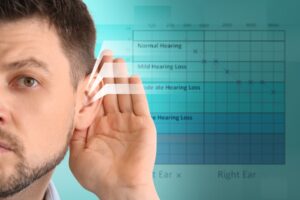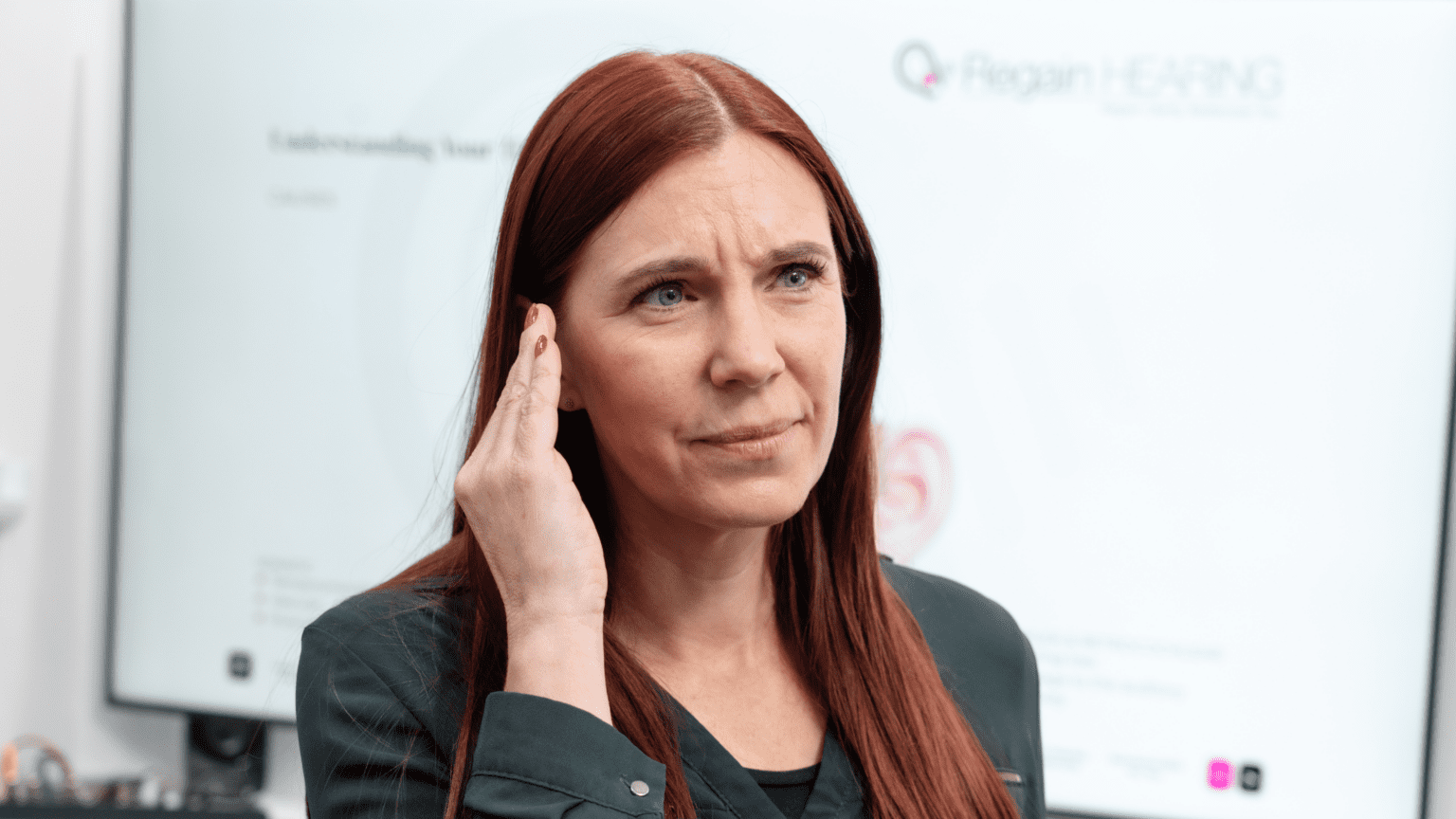Hearing loss is common, particularly in older adults, and is often assumed to be a natural part of the ageing process or something we should accept. However, progressive and ongoing hearing loss can have profound impacts on quality of life and is connected to numerous serious and chronic health concerns.
Emotional impacts of hearing loss can contribute to mental health issues, social isolation, anxiety and depression. This can also extend to physical safety risks, where a person might not be able to drive or walk unaided due to an inability to hear an emergency siren, a car horn, or a signal at a crossing.
Seeking help to address or manage hearing loss is incredibly worthwhile. It can halt treatable hearing loss, reduce long-term hearing function reductions, or enable an audiologist to recommend high-quality hearing aids.
Key Takeaways:
- Hearing loss impacts far more than your ability to converse. It can have safety implications, contribute to mental health conditions, and make it difficult to work, drive, relax or engage with colleagues, family members and loved ones.
- Untreated hearing loss can have life-limiting ramifications, whereas progressive hearing loss is linked to social isolation, depression and cognitive conditions such as dementia and Alzheimer’s.
- Treating the underlying causes of hearing loss or using hearing aids and ear protection to maintain your current hearing is essential. This preserves your ability to hear and ensures you can continue your daily routines with confidence.
What Are the Biggest Impacts of Hearing Loss?
The World Health Organisation (WHO) defines hearing loss as having a hearing threshold of under 20 dB in both ears – although hearing loss can vary significantly, from mild and occasional hearing disturbances to complete hearing loss.
For many, the initial issue with hearing loss is the inability to communicate, particularly in noisy or crowded spaces, where it becomes difficult or impossible to differentiate or tune into one person speaking.
Although communication difficulties are distressing and can make it hard to converse, talk on the phone, watch TV or join in with social events, some of the ongoing impacts can have more significant outcomes:
- Psychosocial impacts, such as distress, embarrassment, frustration and isolation, are common, where people with hearing loss find themselves withdrawing or choosing not to participate in any conversations at all.
- Safety concerns are key, where being unable to hear a kettle, oven timer, warning alarm, or approaching vehicle can all make it challenging to live independently or travel and leave home without help.
Many people living with unmanaged hearing loss become unable to drive a car and lose the ability to function in their normal way within a workplace.
Although employers should be able to make adjustments, hearing impairments can make the workplace harder to navigate, with reduced opportunities to engage in certain professions where dialogue is a core responsibility.
They may also experience a decline in their quality of life due to the fatigue associated with straining to hear and being unable to watch TV, listen to music or even chat with a partner without discomfort.
What do our experts say?
Hearing loss impacts more than just our ability to hear—it affects our relationships, our confidence, and our overall quality of life. When we struggle to hear, we can feel disconnected from conversations, miss important moments, and even experience increased stress and fatigue. Addressing hearing loss early can help us stay engaged, connected, and fully present in our daily lives. Lindsay Fletcher, Company Director & Consultant Audiologist.
How Does Hearing Loss Affect Your Long-Term Health?
Alongside the immediate and progressive negative impacts, hearing loss is also closely associated with a broad number of chronic health conditions and degenerative cognitive diseases, more commonly in older people.
Related reading: Does hearing loss cause cognitive decline?
While hearing loss does not necessarily mean you will develop a secondary condition, it is also often linked with the following:
- Fatigue and exhaustion, due to the stress of needing to concentrate heavily to follow a conversation.
- Impacts on mental wellbeing and mood, with social isolation, depression, anxiety and self-criticism common. Related reading: Tinnitus and depression: What is the link?
- Cognitive decline, where conditions that impact short-term memory, such as dementia, are exacerbated or become higher risk due to the drop in brain functioning as it becomes harder to process sounds.
- Tinnitus and imbalance conditions like vertigo, where the delicate elements within the inner ear are also responsible for aspects of our balance and depth perception.
It is important to remember that most cases of hearing loss can be well controlled with the right clinical diagnosis. Hearing loss can cause acute distress and other health concerns but may be easy to treat, mitigate or manage over the long-term.
What Are the Best Ways to Treat or Cure Hearing Loss?
The best solutions to manage hearing loss, prevent further loss of hearing, or ensure you have the ability to focus and hear with ease will depend on the reasons behind your hearing loss.
Audiologists group the countless disorders that can cause hearing loss into two categories:
- Conductive hearing loss is caused by an injury, malfunction or blockage in the ear, such as an injury to your eardrum or impacted ear wax.
- Sensorineural hearing loss is caused by damage to the smaller hair cells within the inner ear. This damage can be caused by ageing, certain health conditions, medication side effects, or exposure to sudden or varied loud noises.Related reading: Can ears recover from loud noises?
Getting to the bottom of the causes or contributing factors behind your hearing loss is step one since a conductive hearing dysfunction is often much easier and faster to correct, often without any expectation that hearing loss will return.
Age-related hearing loss is one of the most frequent diagnoses.
Although it cannot always be ‘cured’ or eliminated altogether, a good ear health routine, professionally programmed hearing aids, and accessibility devices can go a long way to preventing any of the negative impacts discussed here.
How Can a Hearing Assessment Help Control Hearing Loss?
As we’ve seen, the impacts of hearing loss can be hugely detrimental, and ignoring the progression of hearing loss or avoiding speaking about the problem due to embarrassment or frustration is, unfortunately, more common than we might like to imagine.
Speaking with a professional, qualified audiologist at your nearest Regain Hearing clinic can put your mind at ease.
Gentle, comfortable hearing tests can define exactly which sounds, pitches, and frequencies you are struggling with.
From there, we can investigate potential causes, provide confidential advice and support, and ensure you take control of your hearing loss with the appropriate treatments, devices or hearing protection.





 Hearing loss impacts more than just our ability to hear—it affects our relationships, our confidence, and our overall quality of life. When we struggle to hear, we can feel disconnected from conversations, miss important moments, and even experience increased stress and fatigue. Addressing hearing loss early can help us stay engaged, connected, and fully present in our daily lives.
Hearing loss impacts more than just our ability to hear—it affects our relationships, our confidence, and our overall quality of life. When we struggle to hear, we can feel disconnected from conversations, miss important moments, and even experience increased stress and fatigue. Addressing hearing loss early can help us stay engaged, connected, and fully present in our daily lives. 


